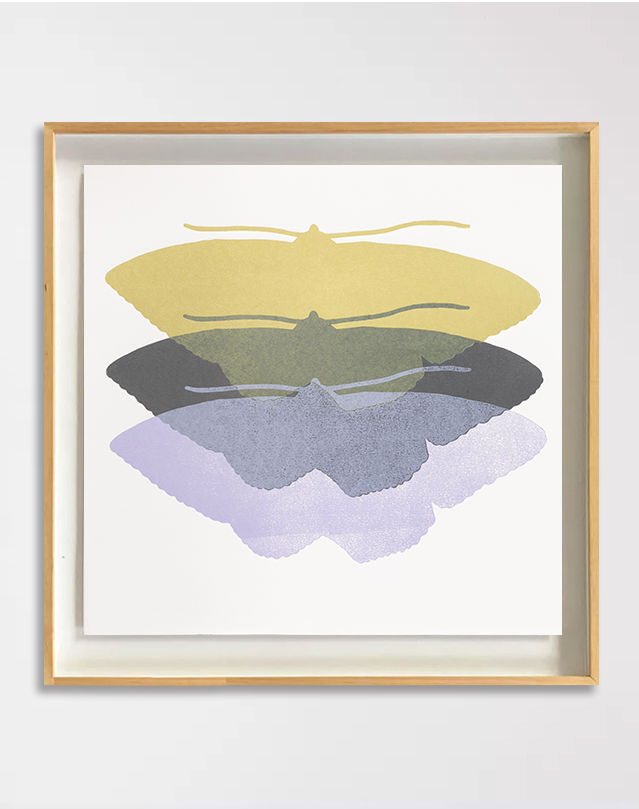Projects
Jardín para polinizadores, 2023-2025
Each of these works takes as its subject the way in which epiphytes from the cloud forest develop their reproductive biology. Ferns do so through spores, while bromeliads and orchids reproduce via flowers and seeds. The project translates the reproductive ecosystems of these plants into an aesthetic vision that responds to their transformations. The goal is to immortalize the desire to see the natural space as a faithful—though not mimetic—expression of seasonal rhythms, framed by the urgency of conservation: an activist form of contemplation.
The conceptual foundation of this proposal is rooted in the deconstruction of the traditional perception of time and its reconstruction through the experience of the natural landscape. It materializes through art and printmaking as tools for studying and understanding places; through walking as both a lived experience and an aesthetic practice in itself; and through observation and contemplation as essential acts of engagement with the environment.

Impresión xilográfica sobre tela 100% algodón 164.5x114.5 cm

Woodcut print on 100% cotton fabric 164.5 × 114.5 cm

India ink on paper 45 × 35 cm

Impresión xilográfica sobre tela 100% algodón 164.5x114.5 cm

Charcoal on paper 50 × 36 cm

Charcoal on paper 50 × 36 cm

Charcoal on paper 50 × 36 cm

Charcoal on paper 50 × 36 cm


















Polillas, 2023
Woodcut print on paper
60 × 60 cm (square format)
35 × 50 cm (rectangular format)
Unique pieces






























Helechos, 2024
Woodblock on cotton paper
50 x 36 cm

Woodblock On Cotton Paper 100 X 125 cm

Woodblock On Cotton Paper 100 X 125 cm

Graphite On Handmade Cotton Paper 43 X 53 cm

Woodblock On Cotton Paper 100 X 125 cm
Epífitas. Calendario textil, 2020
In 2019, I began a research project focused on the remarkable and rare epiphytic species of the cloud forest in the central region of Veracruz. The aim of this investigation is to explore alternative, less abstract ways of measuring time by graphically recording the blooming cycles of certain bromeliads and orchids over the course of a year.
From January to July, Epidendrum longipetalum orchids bloom. Between April and mid-year, the fragrant inflorescences of Encyclia radiata emerge, only to bloom again in December. If the bright red flowers with purple tubular structures of Tillandsia foliosa are in full display, it is February; but if they appear somewhat weary, they herald the arrival of April. From March to August, the delicate purple-stemmed flower of Tillandsia limbata blossoms in splendor. Only in June do the small white flowers of Catopsis sessiliflora adorn trunks and branches. Comparettia falcata, known as the magenta drizzle, releases its delicate raceme during the warmest months, between May and August. The crimson flower of Tillandsia multicaulis radiates between July and October. In autumn, the violet-pink hues and fragrant honey-like scent of the Laelia orchid fill the forest air from October to November. Meanwhile, the veined and ridged Tillandsia punctulata endures the harshest months, with its bloom persisting from November to March.

Woodcut print on 100% linen 90x140 cm

Woodcut print on 100% linen 135x135 cm

Woodcut print on 100% linen 135x135 cm

Woodcut print on 100% linen 90x140 cm

Woodcut print on 100% linen 140 × 100 cm

Woodcut print on 100% linen 140 × 100 cm

Woodcut print on 100% cotton fabric 140x100 cm

Woodcut print on 100% linen 140 × 100 cm

India ink on bond paper 90 x 70 cm

India ink on bond paper 90 x 70 cm

India ink on bond paper 70 x 90 cm

India ink on bond paper 90 x 70 cm